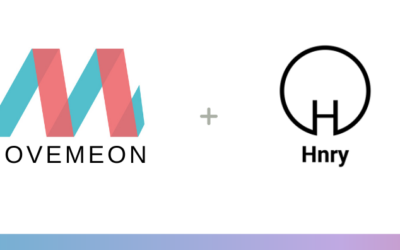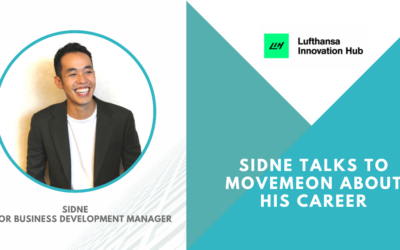Movemeon spotlights are a series of articles highlighting our clients. Here, we speak to Siadhal, the Co-Founder & CEO at Metaview
Interested in working at Metaview? Click here to view roles
—
You’ve had a very interesting career in the world of Product, from Betfair and Uber to your own startup. Please tell us a bit more.
I left university not knowing what to do. I studied History, which is very unusual in the tech world these days. I chose it because I thought it would be interesting, but I had no real plan about work – in fact, I was going to go to law school at BPP after my undergraduate course. Then at the very last minute, as I was hovering over the payment button, I decided to take some time out instead, to think about what I wanted to do. The thing with law is that you really have to love it to enjoy doing it, and I wasn’t sure that was me.
I initially planned to take up the offer at BPP after a year, but a few months into my year out I’d completely forgotten about it – I was just really enjoying what I was doing. I joined a marketing agency, and although I was only there for a really brief period, it really got me thinking about the power of the internet and what impact it was going to have on business. After being there for a few months, I joined Betfair on their graduate scheme. They were pre-IPO at that time, growing really fast – one of the tech darlings of the period.

I was a Strategy Analyst at Betfair; my job was to help the organisation understand what types of products and markets are worth investing in. But while there, I started to get really passionate about what the engineering and product teams were doing, and generally about startup businesses. That was also where I really discovered what product management actually was. Funnily enough, the VP of Product was actually one of the people who interviewed me and championed me to join the company. But when interviewing I didn’t really know what product was yet, so I was initially not keen on joining the product team. It was only after some time that I saw it was the highest-impact part of the business.

After Betfair I did a few different things, and eventually ended up at Osper. I’d always wanted to join a growth-stage startup, and when I joined Osper, they had just raised a series A from Index, so they were at just the right stage for me. I was also really bought into their mission, and they were recruiting for a Head of Product which was also great for where I wanted to be. Osper was one of the first startups to make use of an e-money license, the same thing now-successful companies like Monzo and Revolut ended up launching with. A lot of the people who were at Osper actually joined Monzo later, because Osper was a bit ahead of them, only in a different market – we were focused on children.
The key learning at Osper was that e-money was going to open up more niche forms of money management – basically, you don’t have to be a bank, so you don’t have to have all the attached costs, which means you can serve a particular type of customer to a higher degree. Because we were one of the first to build what was essentially a bank on an e-money license, it was a really interesting time to be involved, and I had a great time. The exposure to the founder was particularly useful. I always say this to candidates we are recruiting too: if you ultimately want to start your own business, it’s a really great education to see someone else doing it – everything from fundraising and approaches to that, to actual company-building.

While at Osper, it was becoming increasingly apparent to me that I wanted to start my own business. I considered doing an MBA, basically to get the credentials to show my passion for business. The other option was to join a top tech brand and see how they operate. I eventually went for the second option, and joined Uber. They were probably the fastest-growing company in the world at the time. They were certainly the most talked-about startup; they were in the news every day.
It was a very exciting time to be at Uber. I moved to the EMEA HQ in Amsterdam and looked after Uber’s driver payments team. This essentially meant working out how we use driver payments as a tool for increasing their engagement – how do we make this type of work more attractive to drivers than other work they could be doing? In the end, it came down to timeliness and flexibility of pay: in typical jobs, people get paid on a fortnightly or monthly basis, so it’s almost like the company is in debt to you 99% of the time. For a platform like Uber, this allows for great differentiation – you can help people go from not having a job to having money in their pocket by the end of the day by using instant payments. So it’s what we did, and driver payments ended up being the biggest Uber product run outside of San Francisco. I was also part of another cool thing, which is moving a team. When I joined, the product and design teams were in Amsterdam and the engineers were in Bulgaria. It’s all Europe so it was almost treated like the same team by Uber, but it’s hard to have half co-location, half remote, and do great work. So we ended up moving the engineering team to Amsterdam too – Amsterdam is now really a first-class citizen location for Uber.

While at Uber, I kept in touch with a colleague from Osper, Shariar, and we ended up co-founding Metaview in 2018. Shariar initially went to Palantir from Osper, where he led on product and engineering. Like Uber, Palantir was a fast-growing US tech company working towards an IPO, so we had a lot of shared challenges.
We ended up deciding to start our own business for two reasons. First, we were both spending a lot of time on recruitment, which was treated as a really important decision by us and our respective businesses. But when it came to interviews, there was no objective data, so decisions were made subjectively – not something you do in any other business-critical matter. So we felt that there had to be a better way, and that the focus had to be specifically on making interviews more data-driven and a source of real insight. The second reason was that we saw that speech-to-text technology was now good enough to make sense of conversations, so you could record and transcribe conversations at scale at marginal cost. That gave us the confidence to take the plunge. At Metaview, we use speech processing to turn interviews into troves of actionable data for exceptional organizations.

You’ve done a lot of work in tech businesses, and on the product side – do you have any advice to new founders for nailing their product?
Where I would always get strength as the product lead on something – where we would generate conviction – is by having so many conversations with prospects and customers that interactions become almost completely predictable, and it’s quite rare that they tell you something you don’t know.

Getting to that point means you can actually really tighten your feedback loops because you can trust your intuition – you know and can embody the customer’s spirit really effectively. When that’s the case, you can really take off. So for me, it’s just unashamedly getting time with people, to understand their problems, their concerns – even if it feels quite tangential to what you’re doing. You never know when that’s going to come round and help you because of how you want to build up your product, but also it’s going to help you with your sales motion.
Click here for more insight into other organisations hiring on Movemeon.com


